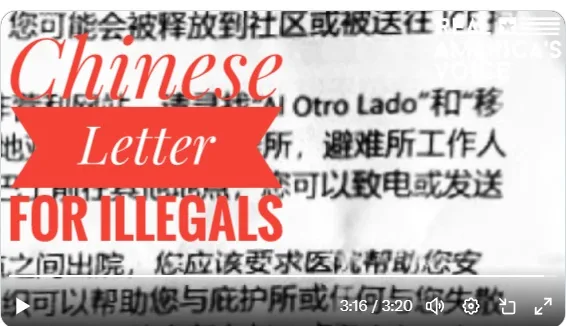According to a Google translation, a form in the Chinese language given to Real America’s Voice, Ben Bergquam, by border law enforcement, outlines the procedures and information for individuals who find themselves detained at camps or processing facilities near the United States-Mexico border.
The form emphasizes the provision of basic necessities like food, water, and medical care, and offers guidance for various scenarios, such as being part of a family, having specific needs, or facing legal issues, giving emphasis to LGBTQ+ individuals.
The text provides information on potential release locations, including shelters and nonprofit organizations, and instructs individuals on how to navigate legal processes, immigration detention centers, and reunification efforts with family members. It also offers contact information for seeking assistance and outlines steps to take if released to a hospital or in need of transportation.
Overall, the text aims to guide detained individuals through the complex processes they may encounter after being apprehended at the border and direct them to the local Non-Profit or NGO that will help them.
Notably:
The provided text highlights the role of nonprofits and NGOs (Non-Governmental Organizations) in assisting individuals who are detained near the United States-Mexico border. These organizations play a crucial role in providing support and resources to individuals in detention. Key points related to nonprofits and NGOs in the text include:
- Release Locations: The text mentions that individuals may be released to shelters and nonprofit organizations. These organizations likely offer assistance in the form of food, water, legal aid, medical care, and continued travel support.
- Central Locations: Nonprofit organizations are mentioned to have central locations where individuals, especially single adults or groups of adults, can be picked up and provided with essential resources and assistance.
- Coordination with Other Organizations: There is an emphasis on coordination between different entities, such as the Salvation Army working with San Diego nonprofits to reunite family members. This suggests collaboration among various nonprofits and NGOs to provide comprehensive support.
- Legal Assistance: Nonprofits and NGOs are likely involved in offering legal assistance, as the text mentions the need for a lawyer in case of an immigration history or criminal record.
- Reunification Efforts: Nonprofits, such as El Otro Lado and immigration defenders organizations, are mentioned as entities that can help individuals reunite with their families after being released.
- Continued Support: The text suggests that individuals released to shelters operated by nonprofits receive ongoing support, including legal, medical, and travel assistance.
- Contact Information: The provision of contact information, such as phone numbers and addresses, for seeking assistance indicates the accessibility and availability of support from nonprofits and NGOs.
In summary, the text underscores the significant role that nonprofits and NGOs play in providing assistance, legal aid, and coordination of services for individuals detained at the border.
See our coverage on the location where Bergquam first heard of the letter:
Here is where Bergquam covered the same NGOs and how they operate, which led to our investigation of the use of COVID funds:
Please consider donating if you want to support our journalism, or visiting our sponsors if you would like to support our work, like My Pillow.com- use code: Frontline America, and follow Bergquam on social media: GETTR, TWITTER, TRUTH SOCIAL, RUMBLE, and Real America’s Voice.
Because of the drastic censorship and political bullying we face to stop covering real news, we are fighting to keep our doors open every day, so if you want to see more of us- please support the sponsors who help us- and consider making yourself part of the patriot economy.

We know from Bergquam’s recent reporting about the CCP:
And about NGOs:
